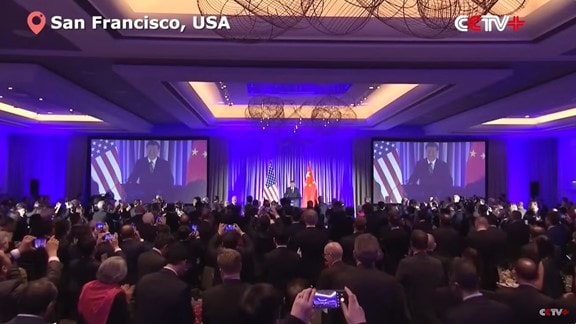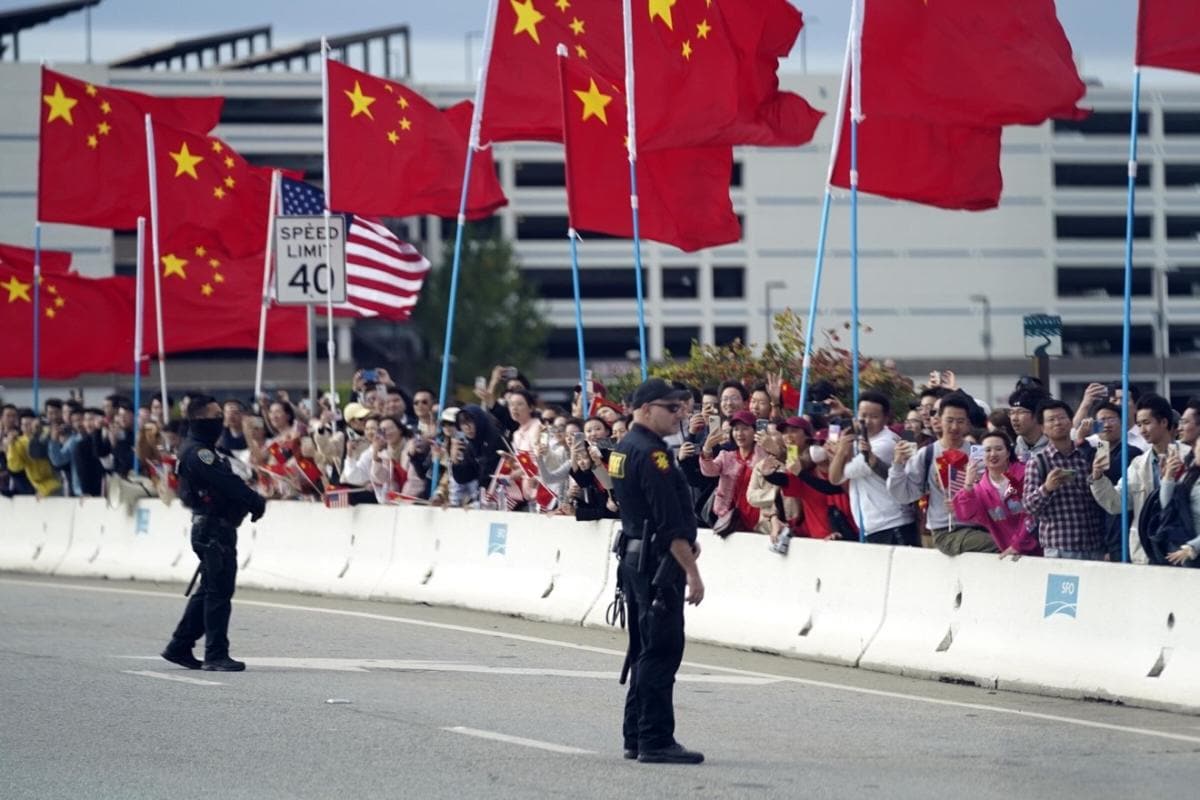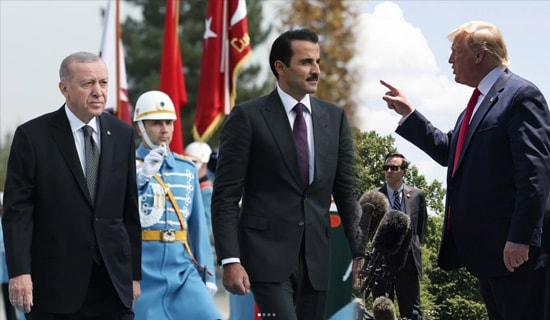On November 15, 2023, Chinese President Xi Jinping took the stage to address a welcome dinner with business executives at a summit of Indo-Pacific leaders in San Francisco, California.[1] On that occasion, corporate America gave the Chinese dictator a standing ovation – not once, but three times. The overzealous welcome was simultaneously appalling and worrying. After all, this is the man, who conspires to steal technologies from Western companies, engages in corporate and military espionage, and is preparing to go to war against the U.S.

In November, U.S. business elite welcomed Xi Jinping with a standing ovation. See the full video.
The standing ovation revealed three realities. First, corporate America does not fully grasp the Chinese threat. Second, there is a misalignment between the U.S. national security and business communities. Third and most alarming of all, it reveals that the U.S. has no overarching, coordinated plan to overcome the Chinese threat.
Worrying too is the U.S.'s seeming defeatist attitude. U.S. media has repeated many times that "it is only a matter of time before China surpasses us." For most, it is an accepted reality. Making matters worse is that this defeatist attitude has never been debunked or corrected by Washington. It is as if the White House is consigned to hand over its preeminent superpower status to China and that its acts of deterrence are only meant to delay the inevitable.
America needs a change of mindset. First of all, it has to decide whether it wants to quash China's ambitions and retain its superpower status. If it does, then it needs a coordinated plan that leverages its economic power, hard power, and diplomatic assets. All cylinders must fire in a synchronized manner with the public and private sectors thinking and acting as one.

San Francisco welcomed Xi in November 2023. (Source: Associated Press)
The Bigger Economy Wins
In this race to shape a new world order, victory will go to the country with the bigger, more influential economy. This is because economic gravitas is the basis on which military might and diplomatic influence are aggregated. The bigger the economy, the more influential a country becomes – it is that simple. That said, if the United States is to preserve its dominant position, it must not allow China to catch up, let alone surpass its economic size.
There are a lot of reparations to be done. To start, the United States must reclaim its manufacturing superiority in basic and strategic industries. These include semiconductors, high-technology defense, shipbuilding, iron and steel, manufacturing equipment, pharmaceuticals, and the like. Although the process is in motion with President Biden's Inflation Reduction Act and 100-day supply chain policy, the process needs to be accelerated.
Next-generation semiconductors are the "oil" of advanced manufacturing, and the United States needs to control this sector too. Washington was right to champion the Chips Act. But as expected, China has found ways to circumvent U.S. controls, principally through third-party importers. This calls for more stringent regulations to fortify the chips blockade. Similarly, the U.S., Japan, and the Netherlands must ensure that China does not get its hands on manufacturing equipment for advanced chips.
The U.S. leadership in next-generation technologies such as AI, biotechnology, quantum, and edge computing must be sustained and secured. Doing so will widen the economic divide between the U.S. and China. Never again should the U.S. allow China to lead in future-forward industries as it did with electric vehicles.
Electric vehicles can potentially grow to a 2.7 trillion-dollar industry and having global dominance in this realm is exactly what China needs to project its power. Washington's plan to quadruple tariffs on Chinese EVs is correct and Europe was right to follow.
Next, the U.S. must regain its status as the dominant trading partner of the world. Economies, both developed and emerging, must have their proverbial bread buttered predominantly by the U.S., and not by China.
Reversing China's Momentum
China is a formidable adversary with a formidable strategy that is already in motion. Admittedly, the momentum is on Beijing's side. But the U.S. still has the bigger economy today. It can crush China's momentum if it consolidates its assets.
It's all about suppressing China's economic ascent. Squelch the wealth, subdue the strength.
The first order of the day is to stop empowering China. This is fundamental. Even today, corporations from the United States and its allies still look at China as a lucrative market and a place to minimize costs. They are woefully oblivious to the fact that every dollar invested, every export dollar earned, and every bit of technology transferred to the communist nation makes them stronger. And this collective strength is used to topple America.
We should be alarmed that despite the Chinese threat, 90 percent of Apple products continue to be produced in China.[2] The same is true for Boeing, Microsoft, General Motors, and Intel to varying degrees. There is a need for the White House to hold its corporate sector accountable for how it abets the adversary, whether directly or indirectly. Corporate America cannot have its cake and eat it too. It must cede to the agenda of national security.
And then there is the issue of capital. Despite the knowledge that Western capital helps fund the Chinese war machine, billions in American pension funds were invested in Chinese stocks and bonds from 2020 to 2022.[3] This must stop.
Severe as these measures may seem, we must not forget that this is a war and what is at stake is the United States' status, the rule-based world order, and our democratic way of life. China is a hostile adversary that is growing in aggression and the United States cannot respond passively. To do so is akin to an open invitation for China to pursue its ambitions with impunity.
The United States needs to quash China's ascent with resolve, leveraging on all its assets. In short, the United States needs a change in mindset. From a defeatist attitude, it must begin acting like the superpower that it is.
*Andrew J. Masigan is the MEMRI China Media Studies Project Special Advisor. He is a Manila-based economist, businessman, and political columnist for The Philippine Star. Masigan's articles in MEMRI are also published in The Philippine Star.
[1] In November 2023, The San Francisco Standard reported: "Xi, 70, started the day with a historic hour-long talk with Biden at the Filoli estate, about 30 miles south of San Francisco in Woodside. He then appeared at the Hyatt Regency Hotel in Downtown San Francisco for the dinner event. The soiree, organized by the U.S.-China Business Council and the National Committee on U.S.-China Relations, came as China aims to reinvigorate the confidence of foreign investors amid concerns about an economic downturn. Tickets to the event cost $2,000 each." Sfstandard.com/2023/11/15/apec-xi-jinping-san-francisco-dinner-business, November 15, 2023. The New York Post also reported: "Xi Jinping is in San Francisco this week, and five deep-pocketed US business moguls reportedly spent $40,000 each to dine at the same table as the Chinese president... Apple CEO Tim Cook reportedly nabbed a $40,000 seat at Chinese President Xi Jinping's table next to Chinese Minister of Commerce Wang Wentao at the dinner event... perhaps a strategic placement given that the China accounts for roughly one-fifth of Apple's consumer electronics sales." Nypost.com/2023/11/16/business/apples-tim-cook-spent-40k-to-have-dinner-with-xi-jinping, November 16, 2023.
[2] Economist.com/business/2022/10/24/the-end-of-apples-affair-with-china, October 24, 2022.
[3] Foxbusiness.com/fox-news-world/billions-us-pension-funds-invested-china-despite-serious-national-security-concerns-expert, January 31, 2024.




.jpg)